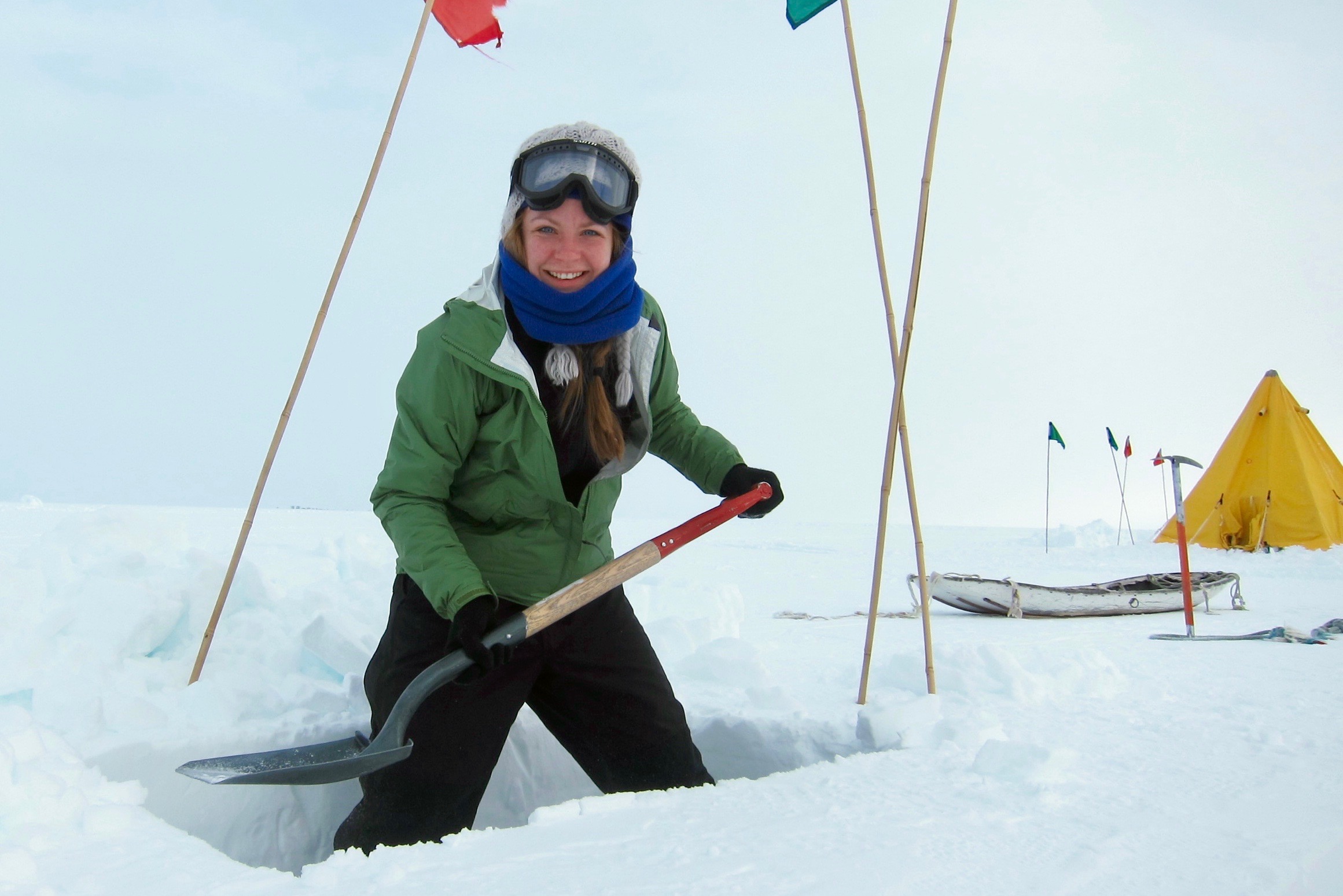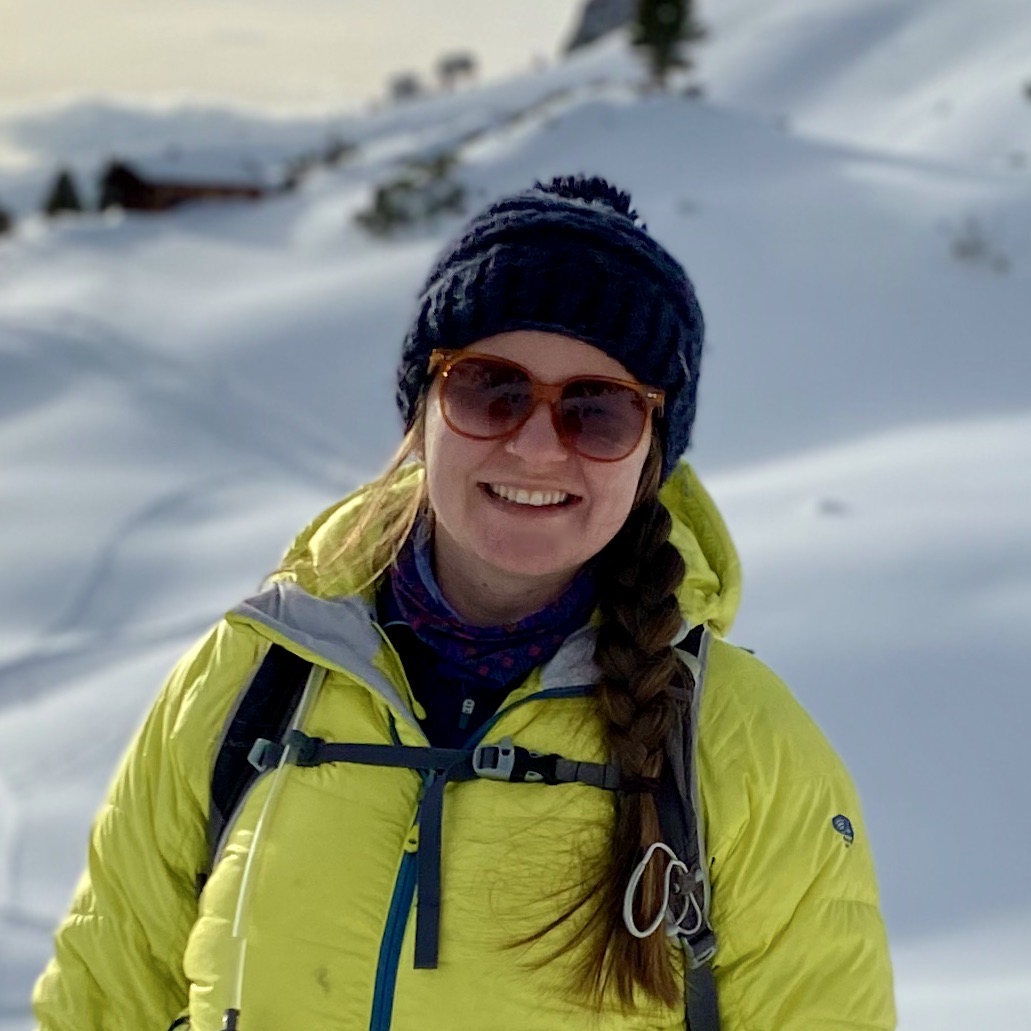
Morgan Seag's research involves taking oral histories of the first women in Antarctica and examining the process of their gradual inclusion.
A lot of women who got their PhDs several decades ago are reflecting on their experience now. A few years ago, many of my interviewees didn’t think gender had been relevant to their careers. Now, some are less certain.
Morgan Seag
How have women integrated into everyday life in Antarctica over the past decades? What strategies have they used to succeed in male-dominated environments and how can polar science be more inclusive and representative?
These are some of the strands of Morgan Seag’s research into the evolving role of women in Antarctica. She is conducting interviews with women from the first generations to work in Antarctica to build up an oral history of the move from exclusion to inclusion. She says the story of women’s integration in Antarctica varies a lot according to which country they originally came from and is linked to national social and political contexts. In the USSR the first women were allowed to work on Antarctic vessels in 1956. In the US no women were allowed to work on Antarctic research stations until 1969. In the UK it was 1986.
The first women to work in Antarctica were mainly scientists and they were initially only allowed in certain places at certain times of year with one of the reasons given that there were no facilities for them. “This was underlied by masculinist ideologies: beliefs that certain types of achievement were inherently masculine, and fears that women’s presence would lead to jealousies and a collapse of morale,” says Morgan [2016] who became interested in women’s role in Antarctica after working there for two seasons running.
She says the first female scientists to stay through the winter in Antarctica were seen as ‘maiden aunt’ figures, with their treatment circumscribed by questions of morality and sexuality. Through her oral histories, Morgan is looking at how those women managed to succeed and thrive. “Women have made tremendous contributions. Some of the attributes they needed to do this were unrelated to their scientific abilities. They had to be able to navigate a male-dominated culture,” says Morgan.
She began her interviews just after the Harvey Weinstein story broke and says the #MeToo movement has impacted her research. “A lot of women who got their PhDs several decades ago are reflecting on their experience now,” she says. “A few years ago, many of my interviewees didn’t think gender had been relevant to their careers. Now, some are less certain. One wondered if she and her peers had to put on blinders to gender-based challenges in order to survive as women in science at the time. The interviews are inspiring, but they can also be challenging.”
Cultural encounters
Morgan’s fascination with the role of women in Antarctica is part of a long-held interest in how diversity and inclusion take shape in different spaces. Morgan was born in New York and her family moved to Kansas when she was nine as her father is a film maker and was making a film there. The change from a metropolitan city to the more conservative, traditionalist Kansas gave her an early interest in cultural encounters, inclusion and empathy.
“I was a city kid, very urban. In New York my parents helped found an independent public school which had a different more child-centred philosophy. There were no grades and it was flexible in defining the curriculum, with an emphasis on semi-structured play and exploration. New York taught me to love learning and pursue my dreams; Kansas taught me to explore difference with empathy,” says Morgan. The family moved back to New York when Morgan was older and she went to middle and high school there and developed her interest in earth and environmental science. In her high school yearbook she said her ambition was to see a volcano, tornado and Antarctica. It was to prove prescient.
West Africa
She applied to major in earth and environmental science at the University of Pennsylvania. However, very quickly she realised that she was better suited to social sciences and switched to political science. She had worked in the study abroad office in her first year and enrolled in an exchange programme in Senegal. She describes the six-month programme as “hugely formative”. In Senegal she joined the university dance troupe. “I was the only non-West African and non-native French speaker. It was an incredible way to build friendships. We communicated through our shared passion for dance,” she said.
When she returned she did a minor in African studies and French, determined to go back to West Africa. When she finished her degree she returned to West Africa and worked for an education consultancy. The experience made her acutely aware of the layers of politics involved in her being a white American woman in Ghana. “I was not sure if I was doing more harm in that role than good,” she says. She went back to New York and reconsidered how she could make a positive contribution.
She started working for an African Film Festival in New York, encouraging cultural encounters between African film makers and American audiences. Funding gaps at the nonprofit meant she needed supplemental work. She worked nights at a restaurant, and eventually her father revived her childhood dream of working in Antarctica by sending her Werner Herzog’s documentary Encounters at the End of the World. Herzog’s film is about people working in Antarctica. It started Morgan thinking and she began researching how to find jobs for non-scientists in Antarctica.
She spotted a job for a dish washer so she applied, got the job and soon found herself at the McMurdo Station, which caters to around 1,200 people in the summer months. She loved her three months there so much that she returned the following year as a head dish washer, this time for six months. She was keen to push herself and experience living outdoors in a field camp. “I had fallen madly in love with Antarctica and I wanted to learn to live outdoors and to see a more remote part of the continent,” she says. “The setting was spectacular. McMurdo is located on a volcanic island that’s covered in ice, with an open crater that puffs a steady plume of steam across the sky. In the opposite direction you can look across McMurdo Sound to a massive mountain range. The sunsets are so colourful. The wildlife, including penguins and killer whales, is incredible.” However, due to funding issues Morgan was unable to get to a field camp.
Cambridge
So instead she decided to apply to Cambridge because of the depth and breadth of research on Antarctica covered by the University. As with her earlier work in Ghana, her interest was in diversity and in how more inclusive cultures are created. “Most people in Antarctica work through a national programme. Every national programme imports both infrastructure and ideas into this otherwise uninhabited space,” says Morgan. “That includes ideas of what Antarctica is and who should be there, doing what. My interest is in how these ideas have manifested in different national programmes, and how those organisations have gradually become more gender inclusive.”
She notes how an increase in the number of women coming to Antarctica has made a difference, building a critical mass of women whose presence has shifted gender norms on ‘the ice’. She adds, though, that the oral histories she had done may be biased towards those women who succeeded. Tracing those who dropped out, including any who left due to the masculinist culture, is harder.
Morgan is tracing the movement to greater inclusion alongside her work as co-chair of the international council of the Association of Polar Early Career Scientists where she focuses on diversity and inclusion in Polar research.
Morgan is interested in how international collaboration can push dialogue on inclusivity in Polar research forwards. This summer she was a panellist at a bi-annual research conference of Arctic and Antarctic researchers. “I want to connect my historical research with what is happening today so that it is not just about understanding how things were, but about positive change,” she says.
The issues that come up today include those around encouraging more women into STEM careers and tackling sexual harassment and creating lasting cultural change. “This work is about social justice,” she states. “It’s also about getting different perspectives and imagining spaces anew – and about doing better science.”

Morgan Seag
- Alumni
- United States
- 2016 PhD Polar Studies at Scott Polar RI
- Girton College
Morgan holds an MPhil and PhD in Geography / Polar Studies from the University of Cambridge and a BA in Political Science from the University of Pennsylvania. She is a science policy consultant, researcher, and communicator with expertise in institutional change, multilateral climate policy, and science diplomacy, with geographical expertise in the polar regions, West Africa, and mountainous areas.
Morgan currently serves as the International Science Council’s Liaison to the UN System, working with intergovernmental organizations and countries’ UN Missions to strengthen the multilateral science-policy interface and advance evidence-based decision-making on urgent global issues. She previously worked with a number of non-governmental and intergovernmental organizations at the science-society-policy nexus, including the International Cryosphere Climate Initiative, the Scientific Committee on Antarctic Research and the Antarctic Treaty Secretariat. Her earlier career was focused on science communication and support, including running informal science education programs in Colorado and California as well as working for the US Antarctic Program at McMurdo Station, Antarctica.
As a PhD student and Gates Cambridge Scholar, Morgan examined the histories of science, policy, and social change in international spaces. In broad terms, she explored the "human" side of these shared spaces: how are they used? by whom? to what end? More specifically, her PhD thesis examined scientific institutions in Antarctica, asking how they evolved to become more gender inclusive over time. As part of this research, she was a visiting scholar at the University of Colorado Boulder and a SCAR Fellow hosted by the University of Tasmania.
Previous Education
University of Pennsylvania
University of Cambridge












